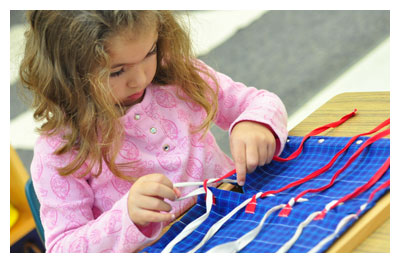 Concentration skills and an active mind. Learning, in Montessori, is not an adult-led process of transmitting knowledge, but rather a process whereby the child teaches himself (with the adult functioning as a guide). The first skill a child needs to acquire is an ability to sustain attention, to concentrate. By offering him activities which he naturally finds interesting, and which lend themselves to repetition which the child enjoys, he learns to focus his mind – and to appreciate his developing ability to solve problems all by himself.
Concentration skills and an active mind. Learning, in Montessori, is not an adult-led process of transmitting knowledge, but rather a process whereby the child teaches himself (with the adult functioning as a guide). The first skill a child needs to acquire is an ability to sustain attention, to concentrate. By offering him activities which he naturally finds interesting, and which lend themselves to repetition which the child enjoys, he learns to focus his mind – and to appreciate his developing ability to solve problems all by himself.
Independence and self-esteem. A toddler or young preschooler will spend a lot of time with “practical life exercises”, which help her develop the ability to take care of her own needs, and to care for her environment – to dress and undress, to prepare foods, to pour water. Our materials are designed – and the teachers trained – to help the child learn how to break down the required actions, to perform them step-by-step, and to do them repeatedly. For example, the “dressing frames” isolate the skill of buttoning with an attractive material; our children enjoy buttoning and unbuttoning, over and over, until they master the skill.
As he acquires skills, the child experiences the pride of independence. At an age during which he might otherwise throw tantrums over wanting to “do it all by myself”, but not be able to accomplish the desired task, he instead learns to do it – all by himself. By perceiving himself as a capable, efficacious person, he acquires real self-esteem – and comes to regard effort as a positive; he becomes an eager learner who seeks out new challenges (which of course he finds in abundance in our classrooms.) In this way the classroom setup perpetuates both the child’s intellectual growth and the accompanying self-confidence.
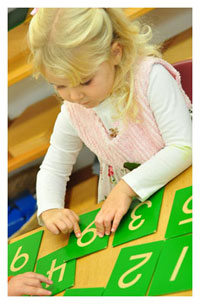 Mature social skills. In Montessori classrooms, children are taught to respect each other and to act with “grace and courtesy” – to walk around another child’s mat, to avoid interrupting when others are speaking, to say “please” and “thank you.” Like everything else in the classroom, social interactions are voluntary (within reasonable bounds) – children choose whether to work alone or together, whether and when to share. Under the expert guidance of the teacher, a Montessori classroom becomes a benevolent and civilized social environment, where children appreciate each other; quarreling over toys, fighting and bullying typically do not happen in a Montessori school – and if they ever do occur, the teachers provide careful guidance meant to teach the children how to address such situations amicably in the future.
Mature social skills. In Montessori classrooms, children are taught to respect each other and to act with “grace and courtesy” – to walk around another child’s mat, to avoid interrupting when others are speaking, to say “please” and “thank you.” Like everything else in the classroom, social interactions are voluntary (within reasonable bounds) – children choose whether to work alone or together, whether and when to share. Under the expert guidance of the teacher, a Montessori classroom becomes a benevolent and civilized social environment, where children appreciate each other; quarreling over toys, fighting and bullying typically do not happen in a Montessori school – and if they ever do occur, the teachers provide careful guidance meant to teach the children how to address such situations amicably in the future.
Academic skills – writing, reading and arithmetic. Somewhat older children – from about 3 ½ – 4 years – learn handwriting and reading by a similar, carefully sequenced process. For instance, children use sandpaper letters and sound games to associate sounds with alphabetic symbols. They naturally develop a sense of quantity by encountering numbers everywhere in their environment – counting snack items, arranging rods by length – and then explore a wide range of math materials to further develop their skills.
By the time our children graduate from their third year in our primary class, they have usually acquired the ability to read full books (not just phonetic three-letter-words); they can handwrite sentences; they know addition, subtraction, division and multiplication into the thousands – and are more than prepared for the most challenging elementary curriculum.

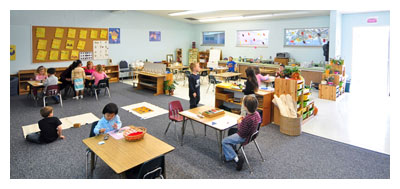 The “prepared environment.” Our classrooms are large, open spaces, framed by low open shelves which display a variety of educational materials or “works” from which a child can choose freely. The attractive materials—made from brightly painted wood, ceramic, metal, or glass—are specially designed to be “self-correcting” and lend themselves to repeated practice. A child using them can independently gauge his own performance, without needing constant feedback from a teacher, and so learning becomes a natural, self-reinforcing process. Classroom furniture is child-sized and can easily be moved about by the children, who thereby learn to adapt the classroom space to many different uses.
The “prepared environment.” Our classrooms are large, open spaces, framed by low open shelves which display a variety of educational materials or “works” from which a child can choose freely. The attractive materials—made from brightly painted wood, ceramic, metal, or glass—are specially designed to be “self-correcting” and lend themselves to repeated practice. A child using them can independently gauge his own performance, without needing constant feedback from a teacher, and so learning becomes a natural, self-reinforcing process. Classroom furniture is child-sized and can easily be moved about by the children, who thereby learn to adapt the classroom space to many different uses.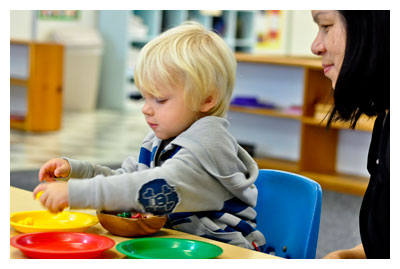 The “demonstration.” Instruction in our primary classrooms is one-on-one, or in small groups. The teacher first introduces an activity that is at the right level of difficulty, i.e. that is challenging but achievable within the range of the child’s abilities. She presents the activity while seated next to the child, moving her hands slowly and precisely so that he can observe her actions. She then has the child repeat the activity. Once the child has been shown how to do an activity in this way, he is thereafter free to choose it at any time and work with it for as long as he likes. As he repeats the activity over time, he acquires mastery of both the motor skills involved, and of the abstract concept—such as length, or color—manifested by the material.
The “demonstration.” Instruction in our primary classrooms is one-on-one, or in small groups. The teacher first introduces an activity that is at the right level of difficulty, i.e. that is challenging but achievable within the range of the child’s abilities. She presents the activity while seated next to the child, moving her hands slowly and precisely so that he can observe her actions. She then has the child repeat the activity. Once the child has been shown how to do an activity in this way, he is thereafter free to choose it at any time and work with it for as long as he likes. As he repeats the activity over time, he acquires mastery of both the motor skills involved, and of the abstract concept—such as length, or color—manifested by the material. Concentration skills and an active mind. Learning, in Montessori, is not an adult-led process of transmitting knowledge, but rather a process whereby the child teaches himself (with the adult functioning as a guide). The first skill a child needs to acquire is an ability to sustain attention, to concentrate. By offering him activities which he naturally finds interesting, and which lend themselves to repetition which the child enjoys, he learns to focus his mind – and to appreciate his developing ability to solve problems all by himself.
Concentration skills and an active mind. Learning, in Montessori, is not an adult-led process of transmitting knowledge, but rather a process whereby the child teaches himself (with the adult functioning as a guide). The first skill a child needs to acquire is an ability to sustain attention, to concentrate. By offering him activities which he naturally finds interesting, and which lend themselves to repetition which the child enjoys, he learns to focus his mind – and to appreciate his developing ability to solve problems all by himself. Mature social skills. In Montessori classrooms, children are taught to respect each other and to act with “grace and courtesy” – to walk around another child’s mat, to avoid interrupting when others are speaking, to say “please” and “thank you.” Like everything else in the classroom, social interactions are voluntary (within reasonable bounds) – children choose whether to work alone or together, whether and when to share. Under the expert guidance of the teacher, a Montessori classroom becomes a benevolent and civilized social environment, where children appreciate each other; quarreling over toys, fighting and bullying typically do not happen in a Montessori school – and if they ever do occur, the teachers provide careful guidance meant to teach the children how to address such situations amicably in the future.
Mature social skills. In Montessori classrooms, children are taught to respect each other and to act with “grace and courtesy” – to walk around another child’s mat, to avoid interrupting when others are speaking, to say “please” and “thank you.” Like everything else in the classroom, social interactions are voluntary (within reasonable bounds) – children choose whether to work alone or together, whether and when to share. Under the expert guidance of the teacher, a Montessori classroom becomes a benevolent and civilized social environment, where children appreciate each other; quarreling over toys, fighting and bullying typically do not happen in a Montessori school – and if they ever do occur, the teachers provide careful guidance meant to teach the children how to address such situations amicably in the future.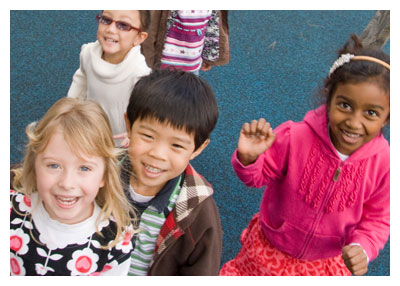 At LePort Schools, our goals is to equip children in their whole being for the adventure of life. From the toddler program through junior high, we strive to arm them with the knowledge, thinking and life skills they need to succeed and thrive. This process begins with our Montessori preschool program. This program enables your child to “build herself”, to develop her personality and to acquire important cognitive skills, to learn how to learn—and to enjoy discovering the wondrous world around her.
At LePort Schools, our goals is to equip children in their whole being for the adventure of life. From the toddler program through junior high, we strive to arm them with the knowledge, thinking and life skills they need to succeed and thrive. This process begins with our Montessori preschool program. This program enables your child to “build herself”, to develop her personality and to acquire important cognitive skills, to learn how to learn—and to enjoy discovering the wondrous world around her.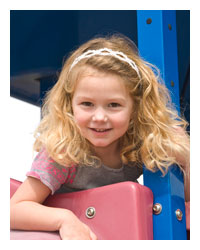 A LePort Montessori a student learns many specific skills—see the table below—but more importantly, she acquires the general, underlying conviction that she lives in an orderly universe and that she can understand and succeed if she tries. She learns the value of being observant and exerting effort, the skills of interacting well with other people, the importance of carefully identifying and naming the objects she encounters, the joy of writing and reading, and the fascinating nature and practicality of math. While at LePort, your child takes the first crucial steps on the road to becoming an independent, self-sustaining, life-loving adult.
A LePort Montessori a student learns many specific skills—see the table below—but more importantly, she acquires the general, underlying conviction that she lives in an orderly universe and that she can understand and succeed if she tries. She learns the value of being observant and exerting effort, the skills of interacting well with other people, the importance of carefully identifying and naming the objects she encounters, the joy of writing and reading, and the fascinating nature and practicality of math. While at LePort, your child takes the first crucial steps on the road to becoming an independent, self-sustaining, life-loving adult.